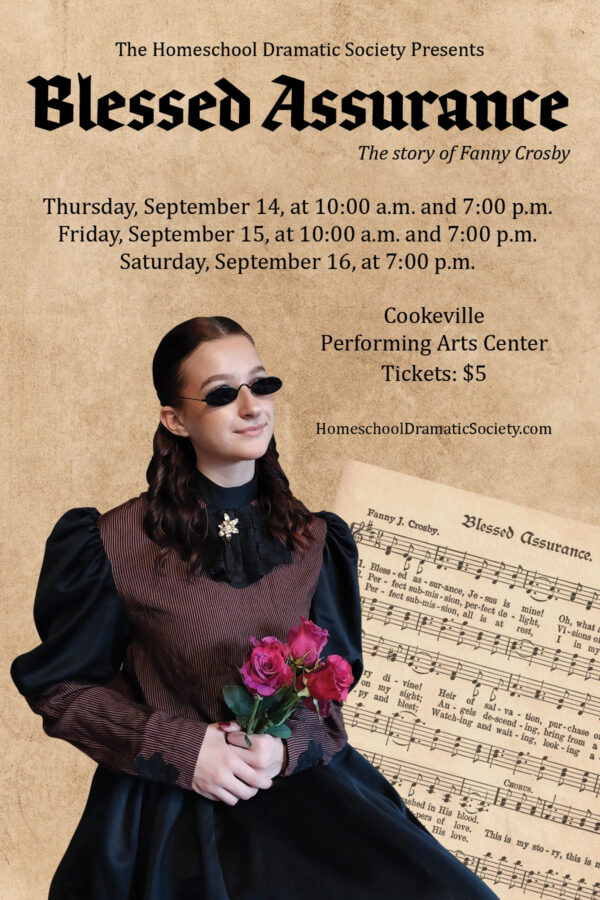Blessed Assurance: The Story of Fanny Crosby, Part 1
Practice starts today for the 24th annual production of our local Homeschool Dramatic Society, directed by our daughter Mary Evelyn McCurdy. If you live in our area or are traveling nearby in mid-September, we would love to see you there. Be sure to buy tickets in advance through the Cookeville Performing Arts Center website. With 101 performers this year, we expect lots of relatives. We have had sold out performances in other years.

Frances Jane Crosby was born in Putnam County, New York, in 1820. Though she became blind at six weeks of age, she became a teacher, a poet, and a hymn writer. She wrote over 8,000 hymns, including some of the most beloved hymns ever written. One of the most famous is “Blessed Assurance.”
Once a preacher offered sympathy to Fanny, telling her that it was a pity that God did not give her sight. She said, “Do you know that if at birth I had been able to make one petition, it would have been that I should be born blind?” When he asked why, she said, “Because when I get to heaven, the first face that shall ever gladden my sight will be that of my Savior!”
Fanny’s parents were John and Mercy Crosby. Fanny was a descendant of a Mayflower pilgrim. One of her great-grandfathers fought in the American Revolution. One of her grandfathers fought in the War of 1812. Fanny’s father died when she was very young. Her mother was only 21 years old at the time. Her mother worked as a maid to support the family. As a child, Fanny spent many hours with her grandmother. As an adult, she wrote a poem called “Grandmother’s Rocking Chair.”
Adults spent many hours reading to Fanny from the Bible. She had a wonderful memory. By age ten, she could recite Genesis, Exodus, Leviticus, Numbers, Matthew, Mark, Luke, and John. The family enjoyed reading poetry aloud, and adults read her many books.
One of Fanny’s favorite pastimes was to sit and listen while she knitted or sat with her hands folded. She loved to listen to rain, storms, and other sounds of nature. While sitting, Fanny would imagine that she was a sailor, a general, the leader of a choir praising God, or a preacher pleading with people to come to Christ.
Fanny climbed trees, rode horses, and played like other children. Gradually she lost her sadness at being blind. She took comfort in the Scriptures and in hymns. She wondered if someday she could make hymns, too. Fanny wrote her first poem when she was eight years old.
Oh, what a happy soul I am,
Although I cannot see!
I am resolved that in this world
Contented I will be.
How many blessings I enjoy
That other people don’t
To weep and sigh because I’m blind,
I cannot and I won’t!
Fanny’s grandfather gave her special encouragement about writing poetry.
Soon after the New York Institution for the Blind (now the New York Institute for Special Education) was founded, Fanny traveled there by steamboat to go to school. She was 14 years old. Braille had not yet become a popular way for blind people to learn. Teachers gave lectures and read to the children. Though a little homesick at first, Fanny had longed for knowledge. She had prayed for it fervently. She enjoyed all subjects except one. About that subject, she wrote:
I loathe, abhor, it makes me sick,
To hear the word, Arithmetic.
Maybe you have a child who feels the same way about arithmetic or another subject. Don’t despair. This blind child who abhorred arithmetic grew up to be the prolific hymnwriter, Fanny Crosby.
See how great a love the Father
has bestowed on us,
that we would be called children of God;
and such we are.
For this reason the world does not know us,
because it did not know Him.
Beloved, now we are children of God,
and it has not appeared as yet what we will be.
We know that when He appears, we will be like Him,
because we will see Him just as He is.
1 John 3:1-2

